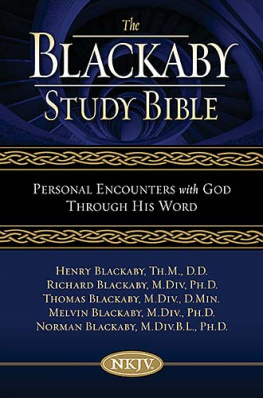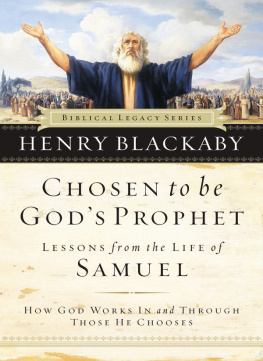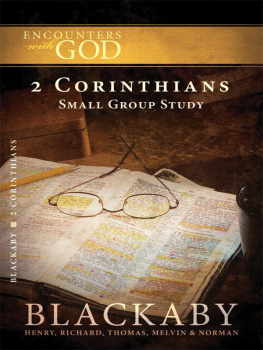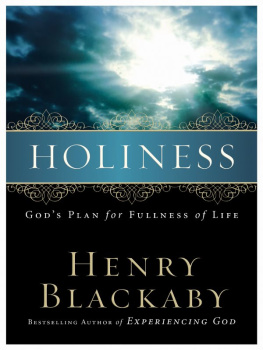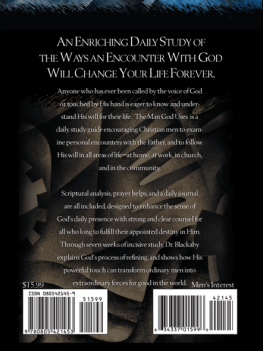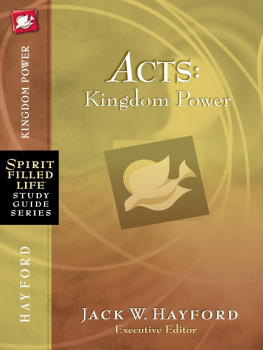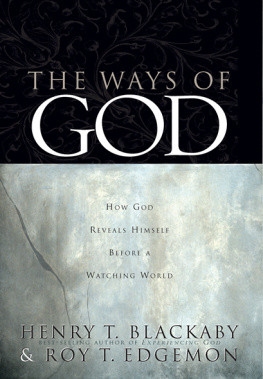CONTENTS
I NTRODUCTION
P ART O NE
C HAPTER 1
C HAPTER 2
P ART T WO
C HAPTER 3
C HAPTER 4
P ART T HREE
C HAPTER 5
C HAPTER 6
C HAPTER 7
C HAPTER 8
C HAPTER 9
C HAPTER 10
C HAPTER 11
C HAPTER 12
C ONCLUSION
S TUDY G UIDE
I NTRODUCTION
GOD'S EXCLAMATION
POINT
Jesus stood and cried out, saying, if anyone thirsts, let him come to Me and drink. He who believes in Me, as the Scripture has said, out of his heart will flow rivers of living water. But this He spoke concerning the Spirit, whom those believing in Him would receive; for the Holy Spirit was not yet given, because Jesus was not yet glorified.
J OHN 7:37-39
W hen it comes to the work of the Holy Spirit in the believer's life, few topics have been so popular and so neglected at the same time. It's a popular topic because people want power; they want to experience something of the divine in their life, something beyond their normal human experience, and the Holy Spirit seems to be the easy ticket. And whereas Jesus is clearly established in his authoritative role as Lord, there's a misconception that the Spirit can be readily manipulated. Because He's called the Comforter, Helper, or Counselor, many Christians assume that the Spirit's purpose is to be our servant and help us enjoy abundant life. But that view is fundamentally inadequate. Jesus sent the Spirit not for us, but for Him to carry out His rule and authority in our lives.
Too often, we fall into a self-centered approach to our walk with God that emphasizes what we get out of it, what we can experience if we're filled with the Spirit. We neglect the biblical teaching that clearly describes the Spirit's role in our lives and what God wants us to experience. But when we finally understand our relationship with the Holy Spirit, we'll then truly experience a transformed life in step with the purposes of God.
T HE P INNACLE OF C HRIST'S W ORK
As we consider the impact of Pentecost and the gift of the Holy Spirit to everyone who believes, we must first keep this topic in context. Think of Christ's work in three distinct yet unified stages: the Cross, the Resurrection, and the gift of Pentecost. All three are significant in their own way but must be understood together as a unified whole. At the Cross, the power of sin and its consequences were dealt a deathblow. Whereas sin once had power over us, now we've been given power over sin. As Paul said, The message of the cross is foolishness to those who are perishing, but to us who are being saved it is the power of God (1 Corinthians 1:18). There should be no proliferation of sin among God's people, for in the Cross we've been given victory over sin.
Why then do God's people still live in sin? There are several reasons, but two stand out above the rest.
First, it's their choice. They've become content to live without the manifest power of God in their lives. Though they've been given all the power they need to overcome the Evil One, they enjoy sin too much to apply the power of the Cross that sets them free.
Second, they've never been fully and clearly taught the truth of God's Word. Though Satan has been defeated, he still has the power to deceive, and those who aren't grounded biblically are his easiest victims. As long as he keeps them from the truth, he can keep them in his imaginary chains.
But make no mistake: the Cross is sufficient. Christ paid the price to forever set us free from sin. Yet the story of the Cross is not the end. Whereas the Cross set us free from sin, the Resurrection gives us power to live a new life. The Resurrection is not another doctrine to believe, but a reality to experience. It is proof of Christ's victory over sin and our hope of salvation. Just as Christ was raised to new life, so we experience new life in Him, a new life that begins the day we accept Christ as our Lord and Savior.
This Resurrection reality brings you into a wholly different dimension that allows you to see and experience what others cannot. Jesus told His disciples, It has been given to you to know the mysteries of the kingdom of heaven, but to them [those who aren't His disciples] it has not been given (Matthew 13:11). Here again, many Christians don't understandor haven't appropriated into their livesthe wonderful power of the Resurrection.
How about you? If you've been given ability to understand the mysteries of God, are you using your spiritual senses to detect God's activity and to adjust your life accordingly? Or do you act like the world, ignoring God until you need Him to bail you out of a crisis? The power of the Resurrection is a gift that must be opened and lived out. And with that gift, those who earnestly seek to live as children of God will walk with Him and experience His purposes in their lives.
The Cross and Resurrection are incredible events with far-reaching impact upon our lives. Yet without the gift of the Spirit at Pentecost, they're inaccessible to us. The pinnacle of Christ's work was to send the Holy Spirit to dwell in the heart of everyone who believes. For the Spirit takes Christ's work on the cross and through the Resurrection and brings that work to bear upon our lives. Thus He completes His work of salvation in our lives.
That's why Experiencing the Spirit is so important as the conclusion of a three-book series that includes Experiencing the Cross and Experiencing the Resurrection. All three events in the life of Jesus stand alone, but they find their intended purpose as a collective whole. This third book becomes, in a way, the exclamation point of all that God has done on your behalf. For the Spirit will bring you spiritual insight, practical application, and empowerment to live out the truth of God's great salvation day by day .
In this book we'll keep returning to various foundational truths about the Spirit from the Word of God, truths that the Lord has engraved on our hearts. We'll revisit them from various angles to help you more deeply reflect on them and respond to them. As the Holy Spirit of God causes your heart to embrace and obey these truths, and as they become more and more at home in your inner being, you'll never grow tired of hearing them and thanking God for them.
W HERE I T A LL S TARTED
Looking back to the church in the first century, we're amazed at the impact of a people who appear to have had inadequate resources for such a monumental task. There were no seminaries to train their pastors, no beautiful church buildings in which to worship, and no such thing as a Bible in every member's hand. They had no elaborate sound systems or multimedia tools at their disposal, no celebrities to endorse their cause, and hardly any freedom to promote their belief in Jesus Christ. For the most part, they were plain men and women, insignificant and unknown, fighting against fierce opposition and hatred. But Scripture testifies that they turned the world upside down (Acts 17:6). Wave after wave of persecution broke over them, yet they emerged victorious. The message of the early church, as told in the book of Acts, is that the bare simplicity of the Christian faith is what counts. The testimony of early Christians was that God's people proclaimed the gospel in the power of the Holy Spirit and confirmed it with holy lives.


